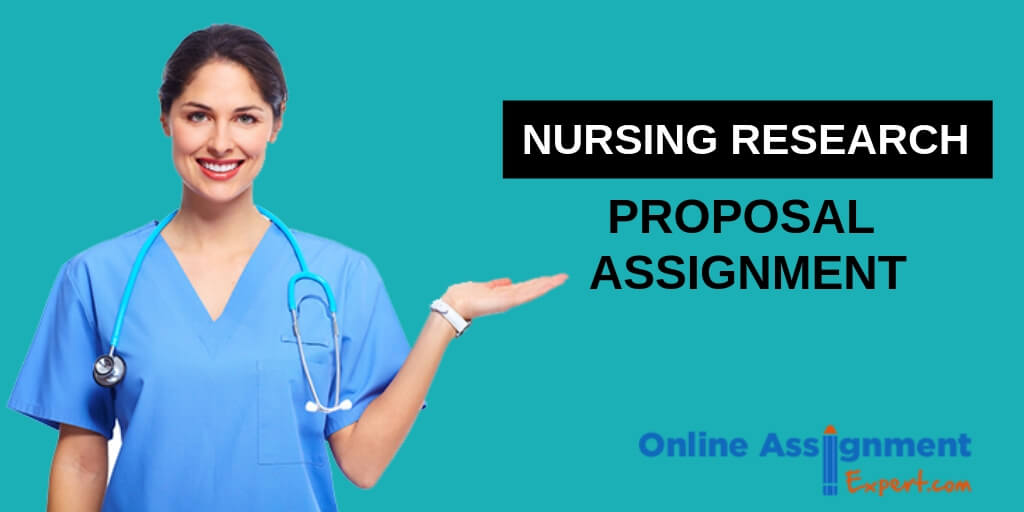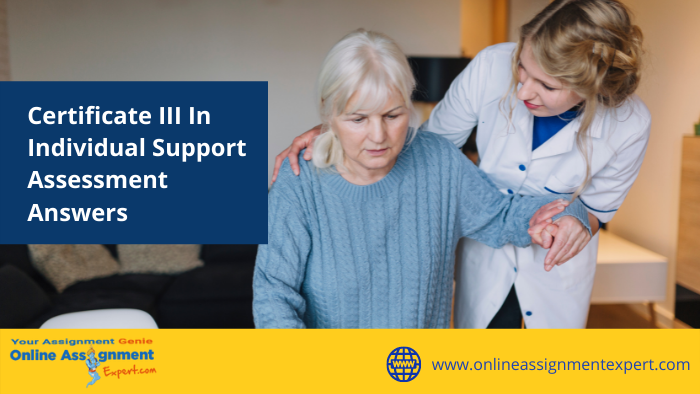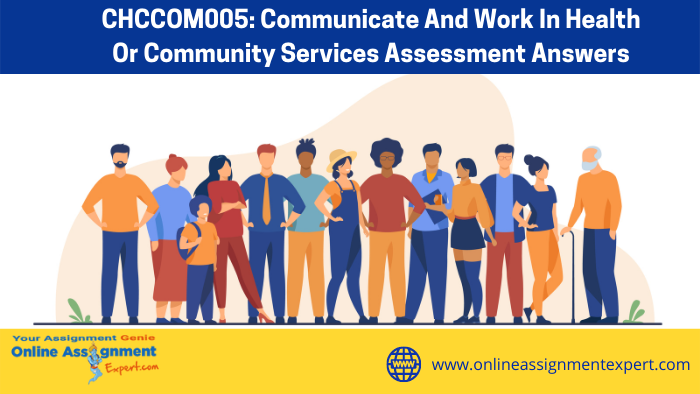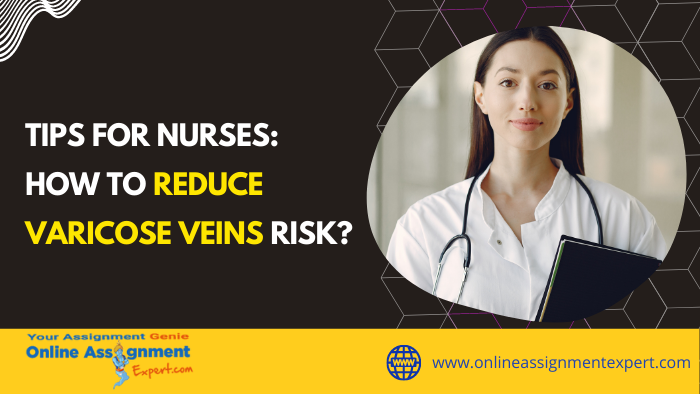
April 25, 2022
Tips for Nurses: How to Reduce Varicose Veins Risk?
No 1 Assignment Help
is only a click away.
Tips for Nurses: How to Reduce Varicose Veins Risk?
Varicose veins are a serious illness which occurs when a person’s veins become swollen and enlarged. In some people, they can cause severe pain and discomfort. According to Medical News Today, around 20% of adults will experience varicose veins. Moreover, The Chicago Vein Institute has estimated that 41% of women over 50 have varicose veins. In addition, moderately overweight women (BMI 25-29.9) have a 50% increased risk of developing varicose veins compared to those who are not overweight. The cause and symptoms related to Varicose veins adhere to various reasons. Risk factors that might be a symptom of this illness include age, family history, pregnancy, obesity, hormonal replacement or contraception therapy, prolonged sitting or standing, etc. Some of these risk factors — family history or age — are harder to avoid than others. But is there a way to prevent varicose veins from forming? Darius (2019) has claimed that there is no definite way of eliminating this condition. Still, there are several medical treatments for this condition, though a person may also wish to try natural home remedies to relieve their symptoms. As a critical field of inquiry, nursing assignment help in Australia is here to provide you with preventive measures to avoid this condition.
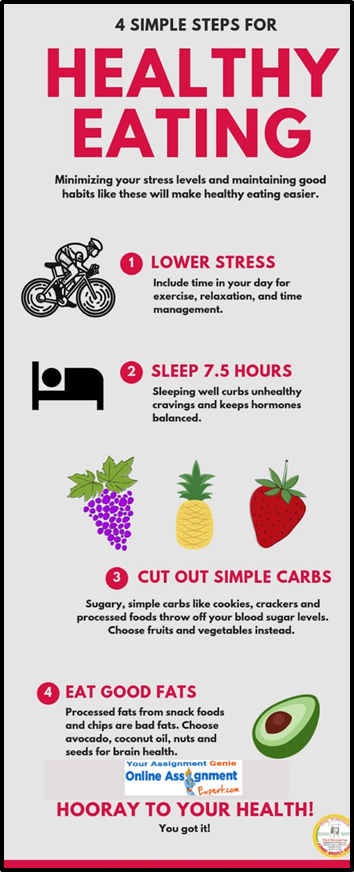
For nursing students in Australia, the assignment help Melbourne provides empirical learning about varicose veins, their causes and effective prevention. In a world where there are millions of ailing patients, nursing as a subject is the need of the hour. Due to this, learning about varicose veins involves rigorous and continuous forms of learning to perfect the art and science of medicine. Nursing courses in Australia invite almost a thousand students each year and require nursing assignment help. In this way, Australia is at the top of nursing studies and research. At Online Assignment Expert, we provide the best nursing assignment help services.
10 Effective Ways for Prevention of Varicose Veins
Our experts have suggested the following simple treatments to Prevent Varicose Veins. Nurses can learn about these remedies and teach these practices to their patients and provide them with these necessary treatments.
- Regular Exercise: Consistent and regular exercise enables blood circulation in the legs, which helps the plod flow collected in the veins. Exercise also helps to lower a person’s blood pressure. Low-impact exercises can help in getting the calf muscles working without excessive strain. Effective, low-impact exercises include swimming, walking, cycling and yoga. Regular exercise ensures that varicose veins and any form of illness do not occur.
- Compression stockings: Compression stockings are an effective way of dealing with Varicose Veins. They are available in pharmacies and can be used by applying pressure to the legs, which aids the muscles and veins move blood toward the heart. A study conducted in 2018found that people who used knee-high compression stockings with a pressure of 18 to 21 mmHg for one week reported a reduction in the pain and aching associated with varicose veins.
- Dietary changes: Evidence has found that foods rich in potassium (such as pistachio or almonds) can help varicose veins by reducing water retention in the body. Moreover, salty or sodium-rich foods can cause the body to retain water, so cutting down on salty food can minimize water retention. Foods high in potassiumcan help to reduce water retention. Foods high in potassium include almonds and pistachio nuts, lentils and white beans, potatoes, leafy vegetables, and some fish, such as salmon and tuna. Foods with fiber help to keep the bowels moving and prevent constipation. This may be important, as straining can aggravate damaged valves or make them worse. Foods high in fiber include nuts, seeds, legumes, oats, wheat, flaxseed and whole-grain foods. People who are overweight are more likely to experience varicose veins; therefore, shedding any excess pounds can reduce the pressure on the veins and alleviate swelling and discomfort.
- Eat more flavonoids: Although it is not possible to eliminate varicose veins, adding flavonoids foods may also help a person shrink or prevent this condition. Flavonoids help improve blood circulation, which keeps the blood flowing and makes it less likely to pool in the veins. They also help reduce blood pressure in the arteries and relax blood vessels, all of which can reduce varicose veins. Foods containing flavonoids include vegetables, including onions, bell peppers, spinach, broccoli, citrus fruits and grapes, cherries, apples, blueberries, cocoa and garlic.
- Herbal remedies: The National Institute of Health Trusted Source has stated that consuming grape seed extract, Vitis vinifera, orally may help in reducing the swelling in the lower legs and other symptoms of chronic venous insufficiency, though there is currently limited evidence for its effectiveness. A person prescribed blood-thinning medication should avoid taking grape seed extract as a dietary supplement, as it can interact with the medication and increase the risk of bleeding. To gain more knowledge and seek useful remedies and bits of advice, our experts from Assignment Help are available to guide you.
- Choosing to wear non-restrictive clothing Wearing tight-fitting clothes can restrict the blood flow, causing severe varicose veins. A person may find that their circulation is improved by wearing loose-fitting clothes that do not restrict the blood supply to the lower body. Thus, wearing comfortable clothes and flat shoes instead of high heels may also help with varicose veins in the legs.
- Keep the legs elevated: Keeping the legs elevated is an ideal preventive measure against varicose veins. At the same height as the heart or above, it will help to improve circulation. This reduces the pressure in the leg veins, and gravity will help the blood flow smoothly back to the heart. A person should aim to keep their legs elevated if they sit down for long periods, such as during work or rest.
- Massage: Gently massaging the affected areas can help to keep the blood moving through the veins. A person can use gentle massage oils or moisturizers for optimal effects. However, it is crucial to avoid pressing directly onto the veins, as this may damage fragile tissues.
- Keep moving: Avoid sitting for long periods. If a person has to sit for long periods for work, they should aim to get up and move around or change position frequently to keep the blood flowing smoothly. Avoid sitting with crossed legs, as this can further restrict blood flow to the legs and feet, which may add to circulation problems.
Thus, taking preventive measures requires well-researched information that has to be applied to your nursing assignments. The world of nursing is now increasingly being dominated by young students who want to gain experience in the medicinal world. Assignment help Melbourne understands that nursing as a subject is a continuously evolving process, and students must be updated with their knowledge base and the latest developments. To have a good nursing academic performance, it is advised to seek help from Nursing assignments help and be prepared for anything that comes in the way of a healthy and sustainable future
Related Blogs
Subscribe Our Newsletter & get Information about latest courses

